
As the demand for renewable energy sources continues to rise, solar panels have become a popular choice for many homeowners. But how do solar panels actually work, and what factors affect their efficiency?
In this article, we will explore the impact of sunlight, temperature, and positioning on solar panel performance. We will also discuss whether solar panels can work effectively during the winter months, and provide tips on maximising their efficiency in colder weather.
We will outline the benefits of using solar panels in winter and debunk common misconceptions about their effectiveness during this season. Whether you're considering installing solar panels or looking to optimise their performance, this article will provide you with valuable insights to make an informed decision.
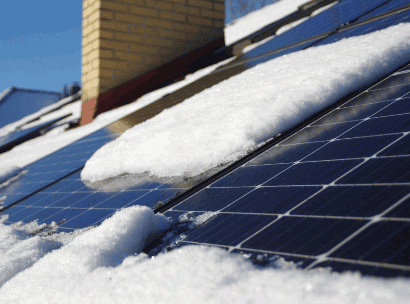
Table of Contents
Solar panels work by converting sunlight into electricity through a system of photovoltaic cells.
These photovoltaic cells are made up of semiconductor materials like silicon, which have the unique ability to convert light into electricity. When sunlight hits these cells, it excites the electrons, allowing them to flow through the material, creating an electrical current. This direct current (DC) electricity produced is then sent to an inverter, which converts it into alternating current (AC) electricity. AC electricity is what powers homes, businesses, and various devices, successfully harnessing solar energy into usable power.
Explore in-depth: Why Is It Better To Use Solar Panels
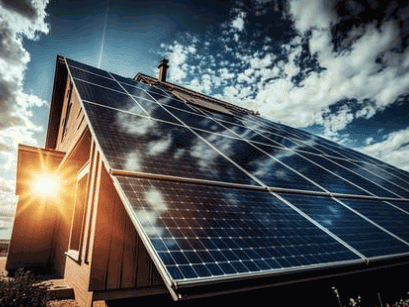
Various factors influence the efficiency of solar panels, impacting their performance and output. These include the amount of sunlight received, operating temperature, and the positioning and angle of the panels towards the sun.
Among these factors, the intensity and duration of sunlight play a crucial role in determining how efficiently solar panels convert light into electricity. Sunlight is the primary source of energy for solar panels, and variations in its availability directly affect their overall efficiency.
Along with sunlight, the operating temperature of solar panels is also a critical element to consider. Solar panels can experience reduced efficiency when exposed to high temperatures, affecting their overall performance and output.
The positioning and angle at which solar panels are installed play a significant role in optimising their efficiency. Ensuring proper orientation towards the sun allows panels to capture maximum light, leading to improved efficiency.
The amount of sunlight directly influences the performance of solar panels, with longer daylight hours and clear weather conditions maximising the electricity output. Regions like the UK, which experience seasonal variations, may see fluctuations in solar panel efficiency based on sunlight availability.
During the sunny months in locations such as the East Midlands, solar panels thrive, converting sunlight into sustainable energy efficiently. Overcast days or heavy cloud cover can significantly reduce the panels' productivity. It is essential for solar panel owners to consider not only the number of daylight hours but also the weather patterns affecting sunlight intensity. The Green Age recommends monitoring the weather forecast to optimise energy production and make the most of the available sunlight for eco-friendly electricity generation.
The angle and positioning of solar panels are essential factors for optimising their efficiency. Proper alignment towards the sun's path ensures maximum sunlight absorption, especially during winter when the sun's angle is lower in the sky.
When solar panels are placed at the optimal angle and direction, they can generate more electricity and improve overall performance. Brands like Panasonic Evervolt and Canadian solar panels are designed to work efficiently when positioned correctly to capture sunlight effectively. Adjusting the tilt of panels with the changing seasons can significantly impact energy production. By carefully considering the orientation and tilt of panels, homeowners and businesses can make the most of their solar installations.
Solar panels can indeed work effectively during winter, including snowy conditions, although their performance may vary compared to the summer months. The impact of reduced daylight hours and snow accumulation can affect electricity generation but does not render solar panels non-functional.
Winter conditions present unique challenges for solar panel efficiency, as snow can obstruct sunlight absorption and reduce energy production. Some companies offer solutions such as snow removal services to maintain panel functionality. Even with less daylight, advancements in solar technology, supported by companies, ensure continued power generation during winter months. Monitoring and optimising panel orientation and tilt can also maximise output in snowy conditions, helping users harness the full potential of their solar energy systems.
During winter, solar panels receive less sunlight due to shorter days and lower sun angles. Whilst this can impact the overall electricity output, modern solar panel systems are designed to generate power even under reduced sunlight conditions.
The reduced sunlight during winter months can lead to a decrease in the efficiency of solar panels, affecting their ability to harness energy. As the Energy Saving Trust advises, the decrease in sun exposure means that solar panels may produce less electricity for households and businesses. This is particularly notable in regions with extreme winter conditions, where snow and frost can further obstruct sunlight absorption.
Advancements in solar technology, such as those from Solis, have improved the performance of solar panels in low-light conditions. These innovations help maximise energy production even during the darkest days of winter, ensuring a more consistent power supply throughout the year.
Lower temperatures during winter can actually improve the efficiency of solar panels, counteracting the thermal effects that reduce performance in hotter climates. Cold weather can enhance the conductivity of the panels, resulting in a more efficient electricity generation process.
This increase in conductivity is due to the fact that lower temperatures cause molecules to slow down, allowing for better movement of electrons across the solar cells. As a result, efficiency levels can increase significantly during the colder months, enabling solar panels to harness more energy from the sunlight they receive.
Companies like The Green Age have conducted studies showing that solar panels can have up to a 20% boost in performance during winter months, as the cooler temperatures help prevent overheating issues that can hamper efficiency. Melissa, a homeowner who installed solar panels, noticed a considerable uptick in her energy production during the winter season, thanks to the favourable conductivity conditions.
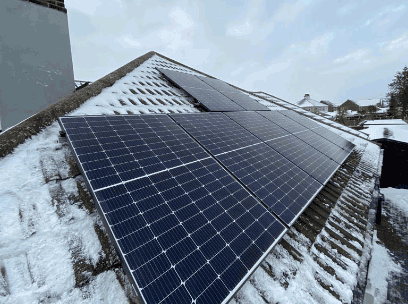
Optimising the angle and positioning of solar panels during winter is crucial to maximise their performance. Adjusting the tilt to capture as much sunlight as possible, despite the lower sun trajectory, can help maintain efficient electricity generation.
When setting the angle of the solar panels for winter, it is essential to consider the specific geographical location to achieve the ideal positioning. For instance, in regions with shorter days and less sunlight exposure, like in Northern latitudes, a steeper tilt is favourable to increase the capture of sun rays. The focus should be on maximising direct sunlight exposure to boost energy production, especially when the days are shorter and the weather conditions are often overcast. Utilising tools like solar angle calculators can aid in determining the optimal positioning based on seasonal changes.
Maximising solar panel efficiency during winter requires proactive measures such as regular maintenance, snow clearance, and adjustments to panel angles. By ensuring the panels are clean, unobstructed, and optimised for sunlight exposure, their performance can be enhanced.
Regarding maintenance, scheduling routine checks to inspect for any damage or dirt buildup is crucial. Octopus Energy and The Green Age recommend cleaning the panels with a gentle soap solution and soft brush to avoid scratches. Keeping the surrounding area free from debris can prevent shading and optimise sunlight absorption.
Snow management plays a significant role in maintaining efficiency. Investing in snow removal tools or installing a tilt mechanism can help prevent snow accumulation on the panels. Monitoring weather forecasts and acting promptly after snowfall can ensure uninterrupted energy production.
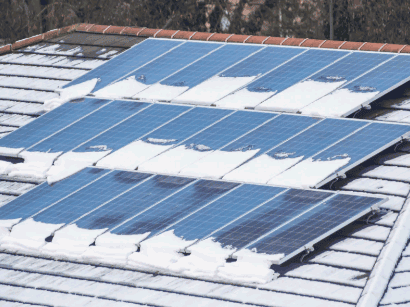
Regular maintenance of solar panels is essential in winter to ensure optimal performance. Inspecting for damage, cleaning dirt or debris, and checking electrical connections can help maintain efficiency during the colder months.
By regularly inspecting solar panels, potential issues can be identified early, preventing more significant problems down the road. Winter weather can be harsh on solar panels, making it crucial to ensure they are in top condition. Cleaning off any dirt or debris that has accumulated is vital as it can block sunlight and reduce energy production. Regular electrical checks are also essential to keep the system running smoothly.
The Smart Export Guarantee encourages the maintenance of solar panels for efficient energy generation. The Environmental and Energy Study Institute promotes the benefits of sustainable energy sources like solar power.
Clearing snow and debris from solar panels is crucial in winter to prevent obstructions that can hinder sunlight absorption. Keeping the panels clean and free from snow accumulation ensures uninterrupted electricity generation.
During the winter months, when snow and debris can accumulate on solar panels, it is imperative to regularly clear them to maintain optimal performance. Snow acts as a barrier, blocking sunlight from reaching the panels and reducing their efficiency. Debris buildup can lead to shading, further diminishing electricity production.
Proper maintenance not only enhances energy output but also extends the lifespan of the solar panels. Organisations like The Green Age and Yes Energy Solutions emphasise the significance of regular cleaning to maximise the benefits of solar energy systems.
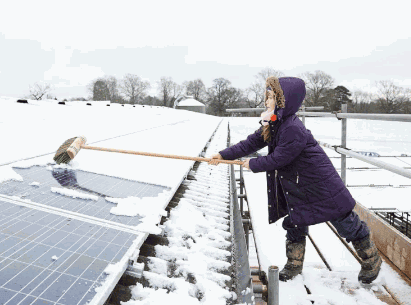
Optimising the angle and positioning of solar panels in winter can significantly boost their efficiency. Tilting the panels towards the sun's path and ensuring unobstructed exposure can maximise electricity generation even in lower light conditions.
By adjusting the panel angle correctly, more sunlight can be captured, enhancing the overall performance of the solar system. In areas like Dorset, where winters can be overcast, ensuring the panels are angled strategically can make a notable difference.
Optimal sunlight exposure translates to increased energy production and cost savings in the long run. Organisations like The Green Age recommend regular monitoring and adjustment to make the most out of solar installations, especially during the winter months. Consistent monitoring and optimisation lead to eco-friendly and sustainable energy generation with minimal environmental impact.
Utilising solar panels in winter offers various benefits, including lower energy bills, reduced carbon footprint, and a reliable backup power source during inclement weather. Meeting electricity needs through solar energy can lead to cost savings and environmental sustainability.
The installation of solar panels can greatly enhance energy security by providing an independent source of electricity, reducing dependence on the grid during the challenging winter months. Renewable energy technologies, like solar panels, are essential in combating climate change and promoting sustainable living. The Green Age, a leading environmental organisation, advocates for the widespread adoption of solar energy to create a greener future. According to Stanford University research, solar panels can still generate significant power even in cloudy or snowy conditions, making them a valuable investment year-round.
One of the primary benefits of using solar panels in winter is the potential for lower energy bills. By generating electricity from sunlight, homeowners can offset traditional energy costs, leading to savings over time.
During the winter months, when daylight hours are shorter and energy consumption tends to increase due to heating needs, solar panels can still harness the available sunlight to power homes efficiently. This means that even during the colder season, households can rely on solar panels to help reduce their reliance on grid electricity and consequently lower their energy bills. As the cost of electricity continues to rise, investing in solar technology becomes not only environmentally friendly but also financially prudent.
Using solar panels in winter helps reduce the carbon footprint associated with conventional electricity generation methods. By harnessing clean energy from the sun, households can minimise their environmental impact and contribute to sustainability.
During winter months, when energy demands are high, solar panels are particularly beneficial in offsetting the reliance on fossil fuels, which are major contributors to greenhouse gas emissions.
The Green Age, a leading advocate for sustainable living, promotes the adoption of solar energy solutions to combat climate change and protect the environment.
Canadian solar panels are known for their efficiency, even in colder climates, making them an excellent choice for regions experiencing harsh winters.
Solar panels serve as a reliable backup power source during winter when grid electricity may be disrupted. By storing excess energy in solar batteries, homeowners can ensure an uninterrupted power supply during adverse weather conditions.
Having a backup power system like solar panels provides an added layer of security, especially in regions like East Midlands where winter storms can cause frequent power outages. The Solis solar battery technology allows for efficient storage and utilization of the energy captured by the panels, making it a dependable solution during emergencies.

There are several misconceptions surrounding the performance of solar panels in winter, with some believing that cold weather renders them ineffective. In reality, modern solar panel systems are designed to operate efficiently even during the winter months.
While it is true that solar panels may experience a slight decrease in efficiency in extremely cold temperatures, this does not mean they stop producing electricity altogether. In fact, solar panels can still generate power throughout the winter, especially on clear, sunny days.
It is important to understand that solar panels rely on sunlight, not heat, to convert sunlight into electricity. Therefore, even in winter, as long as there is sunlight, solar panels can harness its energy and produce power.
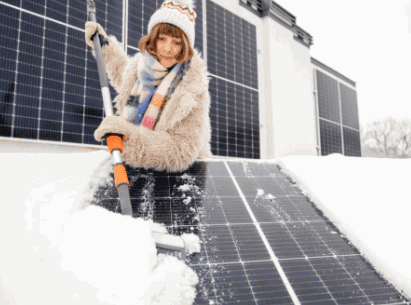
Solar panels offer a sustainable and efficient solution for meeting electricity needs, including during the winter season. By leveraging the benefits of solar energy, individuals can reduce costs, lower their carbon footprint, and ensure a reliable power supply throughout the year.
Solar panels not only help in reducing electricity bills but also contribute significantly to environmental preservation by using a renewable energy source. Companies like Octopus Energy and organisations such as The Green Age promote the adoption of solar panels due to their long-term advantages. Their efficiency in harnessing sunlight and converting it into electricity makes them a reliable power source even in low light conditions. The sustainable aspect of solar panels extends beyond economic benefits to creating a greener and eco-friendly energy landscape for a sustainable future.